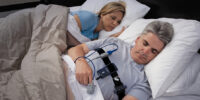What Is The Role Of Alcohol And Smoking In Sleep Apnea?

Sleep apnea is a common sleep disorder characterized by repetitive pauses in breathing during sleep. It can have significant implications for an individual’s overall health and well-being. While there are various factors that contribute to the development and worsening of sleep apnea, the role of alcohol and smoking in this disorder is an important area of study.
Alcohol consumption has been shown to have detrimental effects on sleep apnea. It relaxes the muscles in the throat, leading to an increased likelihood of airway obstruction during sleep. Additionally, alcohol disrupts the normal sleep cycle, resulting in poorer sleep quality and exacerbation of sleep apnea symptoms.
Similarly, smoking has been associated with an increased risk of developing sleep apnea. The toxins in cigarette smoke contribute to inflammation and narrowing of the airways, further obstructing the flow of air during sleep.
Understanding the connection between alcohol, smoking, and sleep apnea is crucial in developing effective strategies for managing this sleep disorder. This article aims to explore the effects of alcohol and smoking on sleep apnea, provide tips for reducing alcohol consumption and quitting smoking, emphasize the importance of lifestyle changes in managing sleep apnea, and discuss other factors contributing to this disorder.
Additionally, seeking medical treatment for sleep apnea will be highlighted as an essential step towards improving sleep quality and overall health.
Key Takeaways
- Alcohol relaxes the muscles in the throat, increasing the likelihood of airway obstruction during sleep.
- Smoking is associated with an increased risk of developing sleep apnea due to inflammation and narrowing of the airways.
- Alcohol and smoking contribute to the relaxation of throat muscles and impair the central nervous system’s control over breathing, worsening sleep apnea.
- Quitting smoking improves sleep apnea outcomes, reducing the frequency and severity of apnea events.
Definition and Causes of Sleep Apnea
Sleep apnea is a sleep disorder characterized by repeated episodes of partial or complete obstruction of the upper airway during sleep, resulting in disrupted breathing patterns and subsequent oxygen deprivation. The condition can be classified into three types: obstructive sleep apnea (OSA), central sleep apnea (CSA), and complex sleep apnea syndrome (CSAS).
OSA, the most common form, occurs due to a physical blockage in the airway caused by factors such as obesity, enlarged tonsils, or a mispositioned jaw.
CSA, on the other hand, is caused by a failure of the brain to signal the muscles responsible for breathing.
CSAS is a combination of both OSA and CSA.
Alcohol and smoking are known risk factors for sleep apnea as they can contribute to the relaxation of the muscles in the throat and impair the central nervous system’s control over breathing. Consequently, these substances can worsen the severity and frequency of sleep apnea episodes.
Effects of Alcohol on Sleep Apnea
Furthermore, the consumption of alcoholic beverages has been shown to exacerbate the symptoms and severity of breathing disruptions experienced by individuals with sleep apnea. Alcohol acts as a muscle relaxant, causing the muscles in the throat and airway to relax excessively during sleep. This relaxation leads to an increase in the frequency and duration of apnea episodes, where breathing is interrupted or significantly reduced.
To understand the effects of alcohol on sleep apnea, consider the following points:
- Alcohol disrupts the natural sleep cycle, causing fragmented and poor-quality sleep.
- Alcohol consumption can lead to weight gain, which is a risk factor for sleep apnea.
- Alcohol can worsen the underlying respiratory problems associated with sleep apnea.
Overall, alcohol should be avoided by individuals with sleep apnea to prevent further aggravation of their symptoms. It is crucial for healthcare professionals to educate patients about the negative impact of alcohol on sleep apnea and encourage them to make lifestyle changes to improve their sleep quality and overall well-being.
Effects of Smoking on Sleep Apnea
Moreover, the detrimental effects of smoking on individuals with sleep apnea extend beyond respiratory health, as smoking has been linked to increased inflammation and oxidative stress, which can further exacerbate the underlying physiological mechanisms of the condition. Smoking can worsen sleep apnea by causing airway inflammation and narrowing, leading to increased upper airway resistance. Additionally, smoking damages the cilia in the airways, impairing their ability to clear mucus and debris, further obstructing the airway. Studies have shown that smokers with sleep apnea have more severe symptoms and a higher risk of complications compared to non-smokers. Quitting smoking has been found to improve sleep apnea outcomes, including reducing the frequency and severity of apnea events. Therefore, it is crucial for individuals with sleep apnea to avoid smoking and seek assistance in quitting to improve their overall respiratory health and sleep quality.
| Effects of Smoking on Sleep Apnea |
|---|
| Increased inflammation and oxidative stress |
| Airway inflammation and narrowing |
| Impaired cilia function |
| Worsened symptoms and complications |
| Improved outcomes with quitting smoking |
Connection Between Alcohol, Smoking, and Sleep Apnea
The intertwining connection between the consumption of alcoholic beverages and the act of smoking can have a profound impact on the physiological mechanisms underlying the condition of sleep apnea.
Both alcohol and smoking have been found to contribute to the development and severity of sleep apnea. Alcohol acts as a muscle relaxant, including the muscles of the upper airway, which can lead to airway collapse and obstruction during sleep. Additionally, alcohol can disrupt the normal sleep architecture and increase the number of apnea events.
Smoking, on the other hand, causes inflammation and irritation of the airways, leading to narrowing and obstruction. It also damages the respiratory system, reducing lung function and making breathing more difficult during sleep.
Therefore, the combination of alcohol and smoking can exacerbate the symptoms of sleep apnea and increase the risk of complications.
Tips for Reducing Alcohol Consumption and Quitting Smoking
To effectively reduce alcohol consumption and quit smoking, individuals may benefit from implementing a range of evidence-based strategies and seeking professional guidance.
When it comes to reducing alcohol consumption, it is essential to set clear goals and limits, as well as avoid triggers and situations that may lead to excessive drinking.
Practicing stress management techniques, such as exercise or meditation, can also help individuals cope with cravings and reduce the desire to drink.
Additionally, seeking support from friends, family, or support groups can provide encouragement and accountability throughout the process.
When it comes to quitting smoking, individuals can consider using nicotine replacement therapies, such as patches or gum, to gradually reduce nicotine dependency.
Behavioral therapies, such as cognitive-behavioral therapy, can also be effective in identifying triggers and developing coping mechanisms to overcome cravings.
Overall, quitting smoking and reducing alcohol consumption require a multifaceted approach that combines personal commitment, evidence-based strategies, and professional guidance.
Importance of Lifestyle Changes in Managing Sleep Apnea
Implementing lifestyle changes is crucial in effectively managing sleep apnea, as these modifications can positively impact sleep quality and overall health outcomes for individuals with the condition.
Lifestyle changes are particularly important when it comes to reducing alcohol consumption and quitting smoking, as both alcohol and smoking have been found to exacerbate sleep apnea symptoms.
Alcohol acts as a respiratory depressant, causing relaxation of the muscles in the throat and reducing the brain’s response to breathing disturbances during sleep.
Smoking, on the other hand, leads to inflammation and narrowing of the airways, making it harder for air to pass through and increasing the likelihood of breathing interruptions.
By eliminating or minimizing alcohol consumption and quitting smoking, individuals with sleep apnea can significantly improve their sleep quality, reduce the severity of their symptoms, and decrease their risk of developing associated health complications.
Other Factors Contributing to Sleep Apnea
Various lifestyle factors, such as obesity, sedentary behavior, and poor dietary choices, have been identified as significant contributors to the development and worsening of sleep apnea symptoms. However, it is important to note that there are other factors that can also play a role in the development and severity of sleep apnea. These factors include alcohol consumption and smoking.
Research has shown that both alcohol and smoking can have a negative impact on sleep apnea. Alcohol relaxes the muscles in the throat, which can lead to an increased risk of airway collapse during sleep. Smoking, on the other hand, can cause inflammation and irritation in the airways, making them more prone to obstruction.
It is crucial for individuals with sleep apnea to be aware of the detrimental effects of alcohol and smoking on their condition. Making lifestyle changes that involve avoiding alcohol and quitting smoking can greatly improve sleep apnea symptoms and overall quality of life.
| Alcohol | Smoking |
|---|---|
| – Increases risk of airway collapse | – Causes inflammation in airways |
| – Relaxation of throat muscles | – Irritation of airways |
| – Worsens sleep apnea symptoms | – Increases risk of airway obstruction |
Seeking Medical Treatment for Sleep Apnea
Another important aspect to consider when addressing sleep apnea is seeking medical treatment.
While lifestyle changes can help alleviate symptoms, medical intervention is often necessary for long-term management of the condition.
There are several treatment options available, including continuous positive airway pressure (CPAP) therapy, which involves wearing a mask that delivers pressurized air to keep the airway open during sleep.
Other treatment modalities may include oral appliances, surgery, or positional therapy.
It is crucial for individuals with sleep apnea to consult with a healthcare professional experienced in sleep medicine to determine the most appropriate treatment plan based on their specific needs and circumstances.
Seeking medical treatment can not only improve the quality of sleep but also reduce the risk of associated health complications.
Frequently Asked Questions
Can occasional alcohol or smoking have any impact on sleep apnea?
Occasional alcohol or smoking can worsen sleep apnea symptoms as they relax the muscles in the throat and interfere with normal breathing patterns. It is recommended to avoid these substances to improve sleep quality and reduce the severity of sleep apnea.
Are there any alternative treatments for sleep apnea aside from lifestyle changes and medical treatments?
Alternative treatments for sleep apnea, aside from lifestyle changes and medical treatments, include continuous positive airway pressure (CPAP), oral appliances, and surgical procedures such as uvulopalatopharyngoplasty (UPPP) and maxillomandibular advancement (MMA). These interventions aim to improve airway patency and reduce the severity of sleep apnea symptoms.
Does the severity of sleep apnea worsen with increased alcohol consumption or smoking?
The severity of sleep apnea is worsened by increased alcohol consumption and smoking. These factors can contribute to the occurrence and frequency of apnea events during sleep, leading to more severe symptoms and complications.
How long does it take for the effects of alcohol and smoking on sleep apnea to diminish after quitting?
The effects of alcohol and smoking on sleep apnea diminish after quitting, but the time it takes for these effects to completely subside varies depending on the individual. Further research is needed to determine the exact duration.
Are there any specific types of alcohol or cigarettes that are more likely to exacerbate sleep apnea symptoms?
There is no clear evidence to suggest that specific types of alcohol or cigarettes are more likely to exacerbate sleep apnea symptoms. However, it is generally recommended to avoid alcohol and smoking altogether to improve sleep apnea symptoms.











